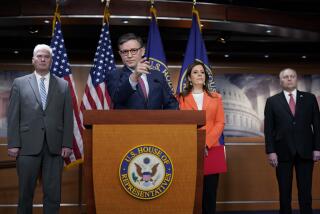IMF Bill Gets Cool Reception in Congress
WASHINGTON — The Clinton administration ran into heavy congressional resistance Thursday to increasing the overall resources of the International Monetary Fund, suggesting that the White House still has considerable lobbying left to do if the measure is to pass.
At a hearing of the Senate Foreign Relations Committee, Chairman Jesse Helms (R-N.C.) urged the administration to press for “fundamental reform” of the 182-country organization in return for congressional approval of the president’s request.
Helms’ remarks, echoed by other committee members of both parties, added yet another barrage of criticism of the IMF, which is leading the international rescue effort for financially troubled Asian countries.
On Wednesday, anti-abortion forces entered the fray by demanding that Clinton back a prohibition against using foreign aid money to finance abortions as a price for approving the IMF measure.
The IMF bill failed to make it through the House during Congress’ pre-adjournment rush last November because the White House refused to go along with the anti-abortion forces.
The current legislation also is being opposed by labor and environmental groups, which contend that the organization is pursuing policies that hurt U.S. workers and “bail out” commercial banks that these critics say have made bad lending decisions and should have to suffer losses.
The administration is seeking $18 billion in lines of credit to provide the U.S. share of the increase in the IMF’s resources--$14.5 billion worth for the organization’s general fund and $3.5 billion for a special emergency fund designed for quick rescue of Asian economies.
White House press secretary Mike McCurry said Thursday that in view of the Asian financial crisis, the administration viewed passage of the IMF bill as vitally important.
“I think as a practical matter, we have to look at the new borrowing authority for the IMF as a first order of priority given the importance of the work the IMF is doing in the region now,” he told a briefing at the White House.
As administration officials have been pointing out, the increase in IMF’s resources does not involve any outlays by the U.S. Treasury. The money is provided as a credit, which is exchanged for an IMF-backed security. If the IMF draws any money, it pays Washington interest on that sum.
Treasury Secretary Robert E. Rubin and Federal Reserve Board Chairman Alan Greenspan told lawmakers on Thursday that the money was needed as an emergency fund in case the crisis in Asia worsens and the IMF needs to provide more funds to keep the slump from spreading.
“Hopefully, this is a low-probability risk, but nevertheless [it is] a risk,” Rubin said.
The demands for reform expressed at the Foreign Relations Committee session were similar to others heard in similar hearings before other panels in the House and Senate. For various technical reasons, the bill falls under the jurisdiction of six separate committees.
There has been no real consensus, however, on what lawmakers actually mean when they demand “reforms.” Helms, for example, said he wanted the IMF to “open its books” to the General Accounting Office, Congress’ watchdog agency, but other lawmakers have had different views.
The IMF already has altered some of its prescriptions for financially troubled Asian countries. It also has been demanding that borrowing nations revamp their economic structures to help root out corruption and cronyism.
Rubin himself has pledged to propose structural and procedural changes in the IMF, but so far has not provided any specifics.
He also has been arguing that the Asian crisis is urgent enough that lawmakers ought to wait until it is over before insisting that the organization overhaul itself.
And he warned on Thursday that it could be as long as two years before the IMF can institute any major structural changes, which must be accepted by the organization’s member countries and, in some cases, approved by their parliaments.
More to Read
Get the L.A. Times Politics newsletter
Deeply reported insights into legislation, politics and policy from Sacramento, Washington and beyond. In your inbox three times per week.
You may occasionally receive promotional content from the Los Angeles Times.










